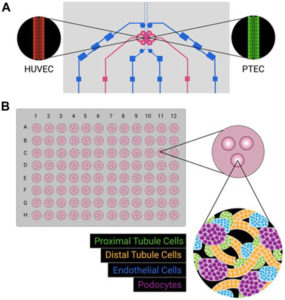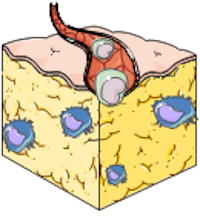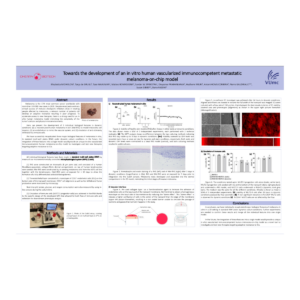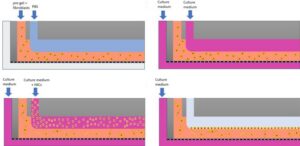Introduction
Kidney Organoid and Microphysiological Kidney Chip Models, both have their own unique advantages and deficiencies. In the realm of drug research and discovery, they both have interesting applications.
In the study of the normal and sick human kidney, kidney organoids are considered significant instruments. Renal organoids have been effectively utilized to simulate glomerular and tubular disorders since the first reports of human pluripotent stem cell-derived human kidney organoids.
On the other hand, a kidney-on-a-chip, in synergy with Microphysiological System, can mimic the structural, mechanical, transport, absorptive, and physiological properties of the human kidney.

The review written below dives deep into the comparison of Kidney Organoid and Microphysiological Kidney Chip Models to Accelerate Drug Development and Reduce Animal Testing.
Abstract
The author states that,”Kidneys are critical for the elimination of many drugs and metabolites via the urine, filtering waste and maintaining proper fluid and electrolyte balance. Emerging technologies incorporating engineered three-dimensional (3D) in vitro cells culture models, such as organoids and microphysiological systems (MPS) culture platforms, have been developed to replicate nephron function, leading to enhanced efficacy, safety, and toxicity evaluation of new drugs and environmental exposures.
Organoids are tiny, self-organized three-dimensional tissue cultures derived from stem cells that can include dozens of cell types to replicate the complexity of an organ. In contrast, MPS are highly controlled fluidic culture systems consisting of isolated cell type(s) that can be used to deconvolute mechanisms and pathophysiology. Both systems, having their own unique benefits and disadvantages, have exciting applications in the field of kidney disease modeling and therapeutic discovery and toxicology.
In this review, we discuss current uses of both hPSC-derived organoids and MPS as pre-clinical models for studying kidney diseases and drug-induced nephrotoxicity. Examples such as the use of organoids to model autosomal dominant polycystic kidney disease, and the use of MPS to predict renal clearance and nephrotoxic concentrations of novel drugs are briefly discussed.
Taken together, these novel platforms allow investigators to elaborate critical scientific questions. While much work needs to be done, the utility of these 3D cell culture technologies has an optimistic outlook and the potential to accelerate drug development while reducing the use of animal testing.”
How to culture vascularized & immunocompetent 3D models in a standard Multiwell
References
Chen WY, Evangelista EA, Yang J, Kelly EJ, Yeung CK. Kidney Organoid and Microphysiological Kidney Chip Models to Accelerate Drug Development and Reduce Animal Testing. Front Pharmacol. 2021 Jul 26;12:695920. DOI: 10.3389/fphar.2021.695920. PMID: 34381363; PMCID: PMC8350564.



